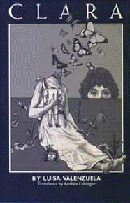

Latin America Literary Review Press, paperback, 9781891270093
Clara is the debut novel of Luisa Valenzuela, who, since its publication in 1960, has gone on to become one of Argentina's most celebrated female writers. This new edition is the first to be published in English for almost twenty years, and provides a very welcome opportunity to revisit a great writer at the beginning of her career.
Clara, the book's eponymous heroine, is a young girl from small-town Argentina. The novel opens with her arrival in Buenos Aires, without money or work to go to. She quickly learns to exploit her body and the power it exerts over the men of the city. What begins as coaxing free drinks and meals out of willing suitors quickly becomes prostitution, a profession she takes to with ease and without reservations. Her streetwalking life becomes curtailed due to the wishes of the men who love her. Their love, however, is not selfless, and successive boyfriends order her to leave the streets behind, not to end her sexual exploitation, but because they demand the exclusive rights to it. Her relationships become a sort of monogamous prostitution, in which her sexuality is bartered for what these partners interpret as love. Clara is a challenging book that attempts to expose the unpalatable truths about the currency of sex, and blurs the boundaries between illicit and respectable forms of sexual exploitation.
In her introduction, Valenzuela discusses the difficulties of 'slipping back into her 21-year old skin'. There
are certainly plenty of signs of youthful naivety in Valenzuela's writing. Clara presents a view of prostitution
that is perhaps a little cosy for comfort and, as for its depiction of relationships, I can only hope that
Valenzuela eventually met men who were something more than the infantile egotists and shallow sexual manipulators
depicted in the novel. Nevertheless, I found Clara to be an almost irresistibly likeable book. The naivety
lends charm to what could otherwise have been a fairly bleak narrative. Clara's poise and self-control make
her a heroine who maybe, just maybe, will win the sexual games she is embroiled in, and a Butch Cassidy-style
freeze frame ending felt uplifting rather than potentially tragic. The tone of the book therefore felt strangely
out-of-kilter with the subject matter, but it all seemed to work. Even a slightly clunky translation with odd
choices of jargon added to the charm. I'm not sure that Valenzuela intended for her readers to feel this way
about Clara, but the result was an engaging, memorable and unique reading experience.
Read a 1991 interview with Luisa Valenzuela by Linda Yablonsky in this BOMB Magazine article.
